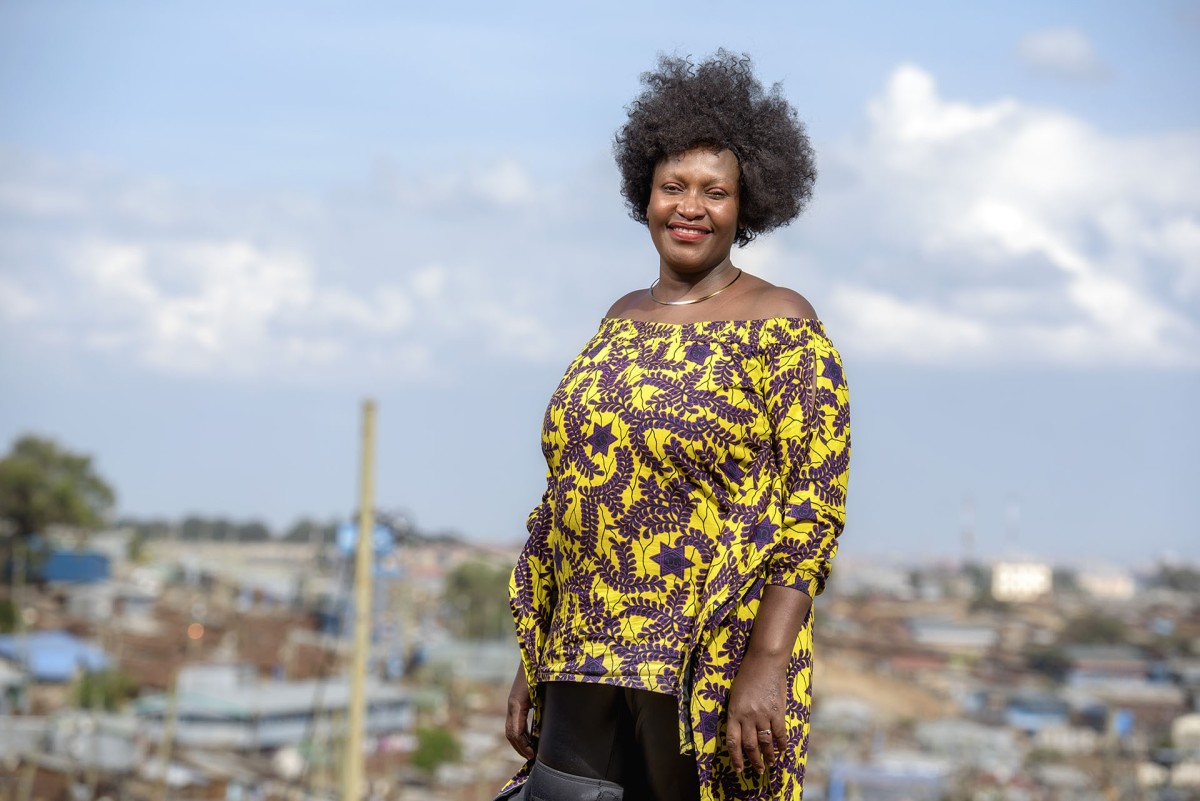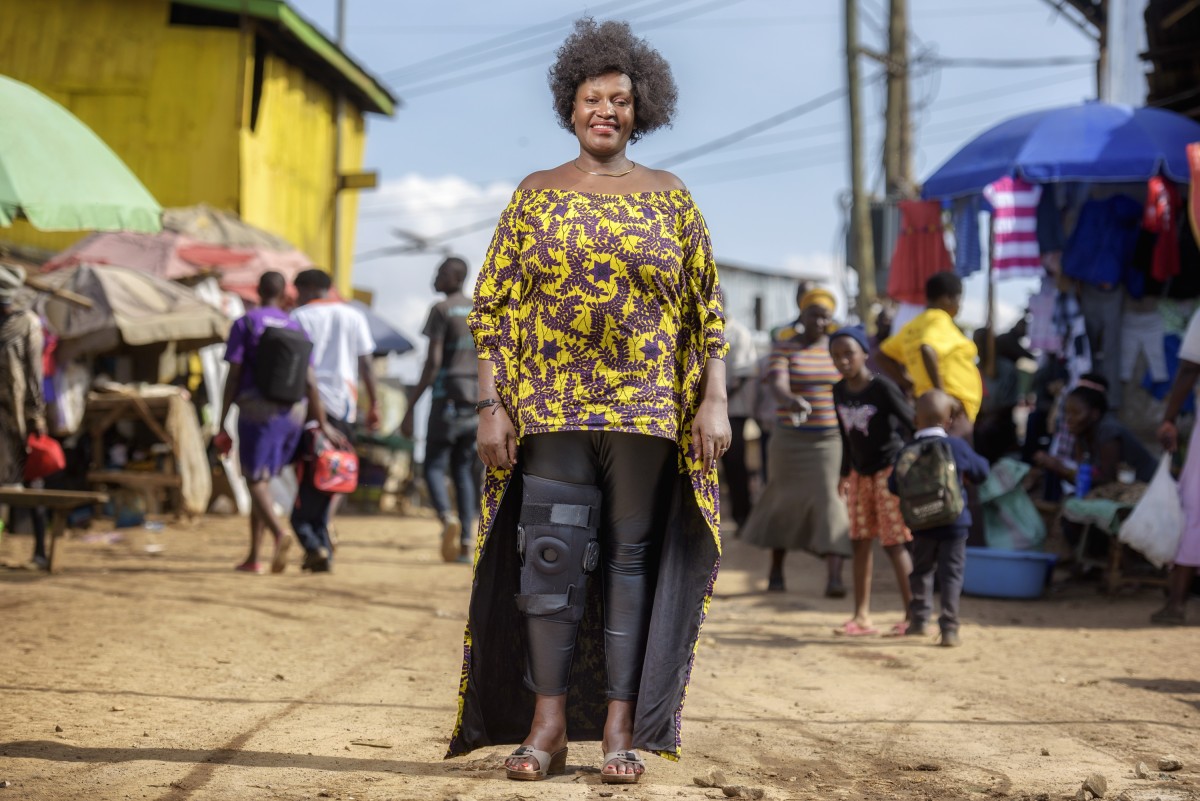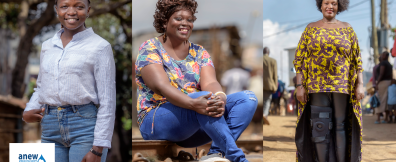Cecilia Achieng Ayot combats violence against girls and women as a local politician
Warning: this article contains content on (sexual) violence

Water points in hands of cartels who determine the water price
Nowadays, Cecilia Achieng Ayot, combats violence against girls and women as a local politician. The 44 year old was born and raised in the Kenyan slum of Kibera.
When she was a young girl, her sister was raped and infected with HIV when fetching water, tells Cecilia: ’When I was 7 years old, my sister and I often had to walk more than three kilometres to fetch water,’ says, emphasising that the situation in Kibera has not improved since then.‘Almost all water points are in the hands of cartels who determine the water prices,’ explains this local female elected representative. ‘This makes water close to home too expensive for most families, including ours, so girls are sent by their mothers further away to find cheaper water,’ the politician continues.
Women and girls sexually exploited by cartels
Cecilia and her sister often went to the golf course that neighbours the slum in the evening, since there was water there to maintain the golf course. 'We gave the guards some change so they would let us fetch water there,' she says.
But things went horribly wrong one night. 'It was dark and my sister was raped by a strange man, who it later turned out was infected with HIV.' The incident had tremendous consequences for Cecilia’s sister, who even had to stop going to school. The same thing happened to many of Cecilia’s friends.
Another problem is that many young women and girls are persuaded to exchange sex for water. 'Since Kibera is an informal settlement, the water supply is not regulated by the government, but by private groups that are primarily interested in earning money and who try to sexually exploit young girls and women,' says the representative, who has been concerned about this problem for years.No access to a fundamental human right: water
'These girls are completely uninterested in having sex with these men, but are desperate. They see no other option,' stresses Cecilia. 'It is an appalling humiliation for these young women, who are only trying to have access to a fundamental human right: water.'
Cecilia remembers well how, at the age of eight, she once went to fetch water together with a friend. But on arriving at the water point, the price had been raised due to a water shortage and the girls did not have enough money.'The boy overseeing the water point had us wait endlessly until everyone was gone, filled our jerry cans and then placed them in a nearby house. We had no choice but to follow him to his house. Once inside, he tried to assault us, but fortunately, a neighbour happened to pass by and saved us. My friend and I still think back about what would have happened if that neighbour had not walked pass at that exact moment.'
The boy was never prosecuted and Cecilia suspects that he has assaulted quite a few girls over the years and has infected many of them with HIV. 'I still see him when I pass the water point and he is visibly sick,' sighs the politician.

Sex for water was a serious taboo
For years, the sex for water problem was a serious taboo that no one talked about. 'Kibera is a place of extreme lawlessness,' explains Cecilia. 'When parents report the rape of one of their daughters to the police, the police usually do not do anything about it. The family then returns home and must live with the consequences, with the offenders often living right around the corner and able to easily inflict harm.'
'As a result, you often see that a daughter in the same family is raped by the very same man who raped her mother. And that the offender simply gets away with it. This discourages many families from reporting sexual assault or rape. It breaks down the women who are only trying to survive without talking about their problems.'
'I hope that society and international organisations can continue to offer assistance and solutions, while we try to force the government to make changes.’
Slums also deserve government services
Cecilia is currently advocating efforts to changing this situation. 'Access to water is an issue that lies close to my heart,' she says firmly. Yet it is difficult for her that, even as a representative, she is unable to bring about change in the short term. 'I finally have a seat at the decision-making table, but have discovered that there is still little I can do because essentially no government services are offered in the slums.'
Cecilia believes that this must change – and as soon as possible. 'How can you set up a polling site in a slum during an election, but then fail to offer government services afterwards?' she wonders aloud.
The politician fears that patience and perseverance are needed to get the government to understand that people who live in slums are also taxpayers who deserve access to government services. 'In the meantime, I hope that society and international organisations can continue to offer assistance and solutions, while we try to force the government to make changes.'Battling the cartels
In her struggle, however, Cecilia is forced to battle the cartels as well. 'Most recently, a well connected to a health centre in Kibera was destroyed. This left an entire neighbourhood without water. After I arranged for a water truck to bring in water for the people, the truck was stopped by the people from the cartels because they did not want the people to receive help. After all, this would jeopardise their power.'
Cecilia hopes that there will one day be enough water for everyone in the slums. 'This would mean that the cartels would no longer have the possibility to blackmail or sexually exploit anyone.'

